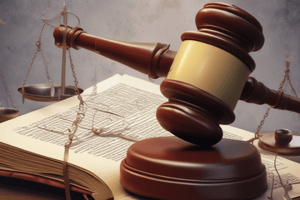Podcast
Questions and Answers
What does the doctrine of res ipsa loquitur allow a plaintiff to do?
What does the doctrine of res ipsa loquitur allow a plaintiff to do?
- Require a witness to testify
- Only claim damages for physical injuries
- Dismiss a case without any evidence
- Establish negligence without direct evidence (correct)
In the context of medical negligence, what is required to imply the negligence of defendants?
In the context of medical negligence, what is required to imply the negligence of defendants?
- A signed waiver from the patient
- Proof of direct negligence by the medical staff
- An accident that provides reasonable evidence (correct)
- A second opinion from another physician
Which of the following best describes the 'last opportunity rule'?
Which of the following best describes the 'last opportunity rule'?
- The plaintiff has no chances of receiving compensation
- The defendant who had the last chance to avoid harm is liable (correct)
- Injuries must be directly caused by the defendant's actions
- Defendants are typically exonerated with good behavior
What is implied by the term 'neighbour principle' in negligence law?
What is implied by the term 'neighbour principle' in negligence law?
Which statement is accurate concerning the remoteness of consequences in negligence claims?
Which statement is accurate concerning the remoteness of consequences in negligence claims?
What might the doctrine of alternative danger allow a defendant to argue?
What might the doctrine of alternative danger allow a defendant to argue?
In a scenario where a malfunctioning elevator causes injuries, what must the defendant demonstrate under res ipsa loquitur?
In a scenario where a malfunctioning elevator causes injuries, what must the defendant demonstrate under res ipsa loquitur?
What is a common misconception regarding establishing negligence using res ipsa loquitur?
What is a common misconception regarding establishing negligence using res ipsa loquitur?
What can the Last Clear Chance Doctrine assert in a negligence case?
What can the Last Clear Chance Doctrine assert in a negligence case?
In the case of Davies v. Mann, who was ultimately found to have had the last clear opportunity to prevent the accident?
In the case of Davies v. Mann, who was ultimately found to have had the last clear opportunity to prevent the accident?
What principle does the Law Reform (Contributory Negligence) Act 1945 rely on when determining damages?
What principle does the Law Reform (Contributory Negligence) Act 1945 rely on when determining damages?
In Yachuk v. Oliver Blias, what was the primary reason the court determined there was no contributory negligence on the part of the child?
In Yachuk v. Oliver Blias, what was the primary reason the court determined there was no contributory negligence on the part of the child?
Which statement best describes composite negligence?
Which statement best describes composite negligence?
What is the effect of contributory negligence on the plaintiff's damages?
What is the effect of contributory negligence on the plaintiff's damages?
How does the Last Clear Chance Doctrine differ from traditional negligence principles?
How does the Last Clear Chance Doctrine differ from traditional negligence principles?
What could be a potential consequence of the court's recognition of contributory negligence in children?
What could be a potential consequence of the court's recognition of contributory negligence in children?
What is the Doctrine of Alternative Danger primarily concerned with?
What is the Doctrine of Alternative Danger primarily concerned with?
Under the Last Clear Chance Doctrine, who carries the burden of preventing the accident?
Under the Last Clear Chance Doctrine, who carries the burden of preventing the accident?
In which situation can a plaintiff recover damages despite their own negligence?
In which situation can a plaintiff recover damages despite their own negligence?
What does the principle of negligence imply in a scenario involving two negligent parties?
What does the principle of negligence imply in a scenario involving two negligent parties?
What consequence does the Doctrine of Res Ipsa Loquitur have in a negligence case?
What consequence does the Doctrine of Res Ipsa Loquitur have in a negligence case?
Which scenario best illustrates the principle of the Doctrine of Last Clear Chance?
Which scenario best illustrates the principle of the Doctrine of Last Clear Chance?
Which of the following is a characteristic of the neighbors principle in tort law?
Which of the following is a characteristic of the neighbors principle in tort law?
Which outcome can occur when the Doctrine of Alternative Danger is applicable?
Which outcome can occur when the Doctrine of Alternative Danger is applicable?
Flashcards
Doctrine of Alternative Danger
Doctrine of Alternative Danger
A legal principle where a plaintiff can recover damages even if they took a risk to escape a dangerous situation caused by the defendant's negligence. This applies if the plaintiff's actions were reasonable and necessary to avoid the danger.
Last Clear Chance Doctrine
Last Clear Chance Doctrine
This doctrine applies when both plaintiff and defendant were negligent, but the defendant had the final opportunity to prevent the accident. Under this doctrine, even a slightly negligent plaintiff might recover damages.
Duty of Care
Duty of Care
This is the legal obligation to exercise a reasonable standard of care to prevent injury to others. Failure to meet this standard leads to negligence.
Negligence
Negligence
Signup and view all the flashcards
Contributory Negligence
Contributory Negligence
Signup and view all the flashcards
Last Clear Chance as a Defense
Last Clear Chance as a Defense
Signup and view all the flashcards
Percentage Share (Contributory Negligence)
Percentage Share (Contributory Negligence)
Signup and view all the flashcards
Contributory Negligence of Children
Contributory Negligence of Children
Signup and view all the flashcards
Contributory Negligence: Child's Low Negligence
Contributory Negligence: Child's Low Negligence
Signup and view all the flashcards
Composite Negligence
Composite Negligence
Signup and view all the flashcards
Calculating Damages in Contributory Negligence Cases
Calculating Damages in Contributory Negligence Cases
Signup and view all the flashcards
Remoteness of Consequences
Remoteness of Consequences
Signup and view all the flashcards
Proximate Cause
Proximate Cause
Signup and view all the flashcards
Remote Cause
Remote Cause
Signup and view all the flashcards
Res Ipsa Loquitur
Res Ipsa Loquitur
Signup and view all the flashcards
Medical Negligence Under Res Ipsa Loquitur
Medical Negligence Under Res Ipsa Loquitur
Signup and view all the flashcards
The Accident Itself Affords Reasonable Evidence
The Accident Itself Affords Reasonable Evidence
Signup and view all the flashcards
It Makes the Plaintiff’s Prima Facie Case
It Makes the Plaintiff’s Prima Facie Case
Signup and view all the flashcards
Defendants Must Explain Their Conduct
Defendants Must Explain Their Conduct
Signup and view all the flashcards
Study Notes
Negligence
- Negligence is the breach of a legal duty to take care that results in undesired damage to another person.
- Negligence is a tort, meaning a civil wrong.
- According to Winfield, negligence as a tort is the breach of a legal duty to take care that results in damage to the plaintiff.
Essentials of Negligence
- A legal duty to exercise due care exists on the part of the defendant toward the plaintiff.
- The defendant's conduct must be within the scope of the duty owed.
- Consequential damages must have occurred.
Duty of Care
- The existence of a duty to take care is essential before holding a person liable for negligence.
- Foreseeability and proximity are important considerations for establishing a duty of care.
- Lord Atkin established foreseeability and proximity in the Donoghue v. Stevenson case. In this case, the manufacturer of a bottle of ginger beer was held liable to the consumer, who fell sick after consuming the product.
Breach of Duty
- The standard of care expected depends on the circumstances and the nature of the relationship between the parties.
- Professionals face a higher standard of care, judged against a reasonable professional's conduct.
Damages
- The breach of duty must have caused actual damages to the plaintiff.
- Damages must be directly foreseeable, not too remote, to hold the defendant liable.
Remoteness of Damages
- Damages are considered too remote if there is a significant gap between the defendant's actions and the resulting harm, or if the harm is highly unusual and unforeseeable.
- The case of Scott v Shepherd established that if one person throws something and it leads to another's harm, it is foreseeable.
- The defendant's actions could not reasonably foresee the extent of the harm, they may still be liable for it if the damage was a direct consequence of their action.
Test of Reasonable Foresight
- The test for determining whether damage is too remote is often based on the principle of reasonable foreseeability.
- A defendant can only be held liable for consequences a reasonable person in the circumstances of the wrongdoer could have foreseen.
- The consequences of the defendant's actions must be reasonably foreseeable in order to establish liability.
Test of Directness
- A person is liable for all the direct consequences of a wrongful act.
- It is not necessary to establish reasonable foreseeability of the result; rather, the focus is on the direct connection between the wrongful act and the harm.
- The directness test has been criticized and rejected in favour of the reasonable foreseeability test.
Contributory Negligence
- If a plaintiff's actions contribute to the injury, their damages may be reduced or even eliminated through contributory negligence.
- The plaintiff may be held responsible for some percentage of the harm if they could/should have been more careful.
- A plaintiff's prior negligence does not entirely eliminate the need for a defendant to act responsibly.
Studying That Suits You
Use AI to generate personalized quizzes and flashcards to suit your learning preferences.




